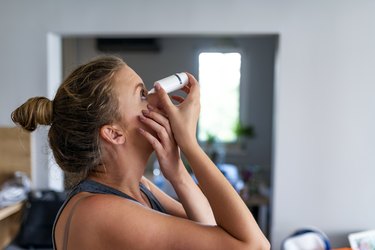
Your eyes are dry. Or red. Or can't stop tearing. Maybe your eyes are burning, too. Should you use eye drops? What happens if you need to use them every day?
When we talk about eye drops, we're referring to common over-the-counter options — specifically, redness-relief drops, artificial tears and allergy eye drops.
Video of the Day
Video of the Day
- Artificial tears: For dry eyes or eyes that burn after staring at a screen for a long time, artificial tears are your go-to.
- Redness-relief eye drops: If your eyes are simply red, you may opt for redness-relief drops.
- Allergy eye drops: You might also use eye drops if the reason your eyes are red, itchy and watery is because of allergies. In that case, allergy-relief eye drops (also available OTC) are for you.
But these all work in different ways. Certain eye drops are safer for long-term use, while others should be avoided altogether.
Artificial Tears
If your eyes are constantly attached to a screen (thanks to that work-from-home life or that constant social media craving), you blink one-third to one-half fewer times than normal, according to the American Academy of Ophthalmology. Without the constant lubrication blinking provides, eyes can begin to dry out, which is uncomfortable.
"Artificial tears are used to moisturize the eyes when they get dry, tired or irritated," Ashley Brissette, MD, clinical spokesperson for the AAO and assistant professor at Weill Cornell Medicine in New York City, tells LIVESTRONG.com. "I tell my patients it's similar to when you put cream on your hands when they get dry. It's the same for artificial tears and the eyes. These drops add moisture to the surface of eyes."
Other causes for dry eye include pollution, airborne allergens, certain medications and hormonal fluctuations, Dr. Brissette says.
What happens, though, if you need to use them daily? Can your eyes become dependent on eye drops? When it comes to artificial tears, it is OK to use these daily, and your eyes will not become dependent, Dr. Brissette says. These are some of the safest eye drops to use.
Also, artificial tears won't damage your eyes. "You can use them every day, as much as you need," Dr. Brissette says.
However, it is possible to overuse certain types of eye drops that then trigger irritation. If you're using eye drops that contain preservatives and your eyes are sensitive, or you're using these often (as in, more than four to six times per day), Dr. Brissette recommends switching to preservative-free artificial tears. (Look for "preservative-free formula" on the label, or something similar.)
But if you're reaching for artificial tears every day and they're not fixing the problem, you're not stuck with parched peepers. Consider seeing your ophthalmologist for a prescription eye drop, Dr. Brissette says. "These drops work to reduce the inflammation caused by dry eye and also help your body produce more tears," she says.
There are many artificial tears out there, so play around with different brands and textures to see what you like best, she says. There are also artificial tears that come as a gel or ointment. These are thick, so they can make your vision blurry. While they're not a great choice during the day, these can come in handy for nighttime because they last longer, Dr. Brissette says.
Redness-Relief Eye Drops
Many of us have these drops in our medicine cabinet, but this is one item to toss. "I do not recommend any eye drops that promise to get the red out. They have an ingredient that causes rebound redness when you stop using it. They are not safe for long-term use," Dr. Brissette says.
There are many reasons why your eyes may be red (e.g. dry eye, irritation, allergies), and she recommends talking to your eye doctor and getting an exam to uncover the underlying cause before shopping for eye drops.
Instead of keeping redness drops around, trade the bottle in for artificial tears, which may help, depending on the cause of redness.
Allergy Eye Drops
These eye drops contain antihistamines to relieve allergy symptoms from outdoor allergens, as well as animal fur and dander. Antihistamine eye drops are best used in the short-term, rather than as a long-term solution. (For instance: While you're waiting for your oral antihistamine to work but you need to stop the eye itch now.)
As for how often to use them, read the instructions on the package, but generally, these are recommended to be used about twice per day. (Look at the formula — some of these combine both allergy and redness relief, so talk to your doctor about what's best for you.)
If you feel like you need to use them more often or every day, talk to your allergist about how you can more effectively manage your symptoms through medications and natural remedies for allergies.
Was this article helpful?
150 Characters Max
0/150
Thank you for sharing!
Thank you for your feedback!
Is this an emergency? If you are experiencing serious medical symptoms, please see the National Library of Medicine’s list of signs you need emergency medical attention or call 911.